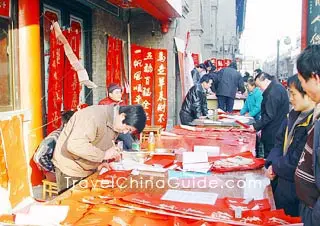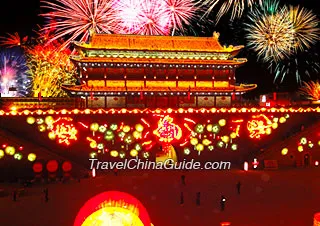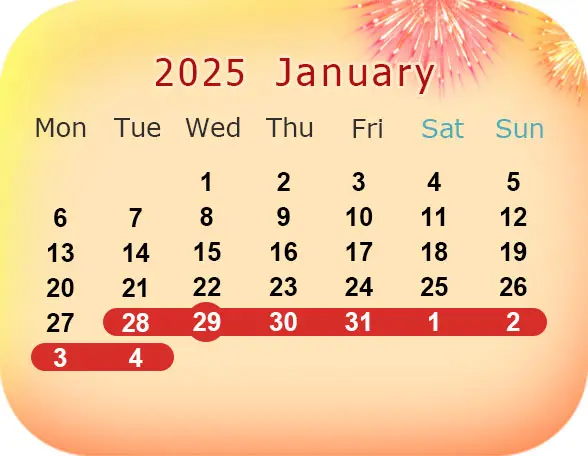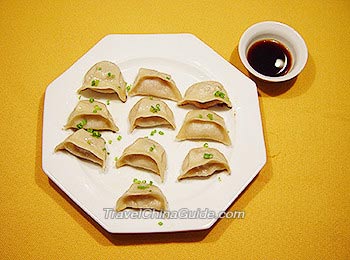配乐散文:《过年了》

最早的春节:相传中国原始社会时就有“腊祭”之说不得,夏朝建立后,此俗流传下来。《尔雅》一书说春节: “夏曰岁,商曰祀,周曰年” 。
最早的除夕:中国农历年的最后一天晚上称为 “除夕”。 “除夕”源于先秦时期的“逐除”。根据《吕氏春秋》中记载:古人在新年的前一天,击鼓驱逐“疫病之鬼”,这就是“除夕”的由来。而最早提到“除夕”这一名称的,是西晋周处的《风土记》。
最早的春联:据《宋史》记载:宋灭蜀的前一年,(公元964年)除夕,后蜀主孟槌写下“新年纳余庆,嘉节号长春”,这是被人们公认的第一副春联。
最早的年画:年画的前身叫门画,最早的年画形式是门神,画的是神话传说中神茶、郁垒,也有的在门上画虎或古代勇士像,到了宋代演变为木版年画。
最早的贺年片:早在宋代就已出现了赠送贺年片的习俗。据南宋人张世南《游宦纪闻》里记载,其家藏有北宋元祐年间敬贺正旦的墨迹。“正旦”就是正月初一,“敬贺正旦”就是现在贺年片上印的“恭贺新年"的意思。
最早的爆竹:春节爆竹之俗始于汉代,当时没有火药纸张,所谓爆竹,是用火烧竹子发出的啪啪声。
最早的压岁钱:据古籍《开元天宝遗事》记载,压岁钱最早出现在唐玄宗天宝年间,嫔妃们在春节三五结伴做掷钱游戏,宫廷钱库就散些钱给她们。此风在当时宫廷内是很盛行的。
New Year Greetings
- Frequently Used Blessing Words












- For Fortune and Career














- For Family and Health









- For students



| 叶子 (2014-01-22 22:47:13) |
|
春节就要来临,我给大家拜年了。 祝大家马到成功,吉祥如意,阖家欢乐,幸福安康! |
| 熊猫 (2014-01-22 22:57:09) |
|
谢谢叶子的一片心意!收下了。也祝你马年幸福如意! |
| 春山如笑 (2014-01-22 23:39:44) |
|
谢谢叶子, 也祝你春节快乐! |
| 雨林 (2014-01-23 00:49:59) |
| 叶子 (2014-01-23 04:22:31) |
|
久违了,可爱的熊猫宝宝。祝你马年快乐幸福!
May the joy and happiness around you today and always.... |
| 叶子 (2014-01-23 04:25:38) |
|
拥抱春山如笑,俺们的美国老乡,祝你新春快乐! |
| 叶子 (2014-01-23 04:27:36) |
|
问好雨林,我也最喜欢这句话:“执子之手,与子携老”,心有灵犀的双眸,相濡以沫的日子,把人生烹调的甘甜长久"。
你有一个幸福的家庭,祝你们全家新春快乐!万事如意! |
| 海云 (2014-01-23 14:00:07) |
|
谢谢叶子,过年好。 |
| 叶子 (2014-01-23 23:40:14) |
|
问好海云, 叶子给你拜年了. 祝你马到成功, 万事如意! |
| 飘尘永魂 (2014-01-25 14:14:12) |
|
谢谢叶子,春节快乐! |
| 叶子 (2014-01-29 05:10:13) |
|
问好飘尘,记得我两年前朗诵过你写的[风中的月台]吗?我一直保留着它。 今天,我把这段录音作了一个简单的视频,把它贴出来,以此寄托一下孩儿们对父母的思念和爱戴。 祝你新春快乐! 马年如意!
风中的月台
文 飘尘永魂 朗诵:叶子
多少次挥手作别 那个小站的月台 风雨中父母远影 常在脑海里徘徊
说不完嘱咐叮咛 寄托深深关爱 年轻时有些嫌烦 怎能真切明白
飘洋过海一生在外 也走不出父母心怀 长大成才踌躇满志 还是父母眼前小孩
再次挥手作别 月台已更新换代 父亲依旧站立风中 只是母亲不能再来
母亲并未走远 已化作天边云彩 默默微笑祝福 远行他乡的小孩
|




